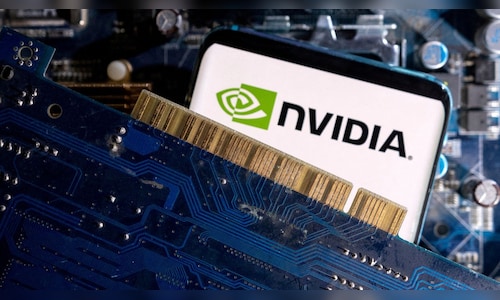Nvidia’s stock slid 8.5% in New York on Thursday, marking the steepest single-day decline in a month. The stock had already been down 2.2% this year, following stratospheric gains in 2023 and 2024 that turned Nvidia into the world’s most valuable chipmaker.
The company also warned that gross profit margins would be tighter than anticipated as it rushes to roll out a new chip design called Blackwell. And there’s the risk of US tariffs weighing on results.
Sales will be about $43 billion in the fiscal first quarter, which runs through April, Nvidia said on Wednesday. Analysts had estimated $42.3 billion on average, with some projections ranging as high as $48 billion.
The mixed outlook comes at a shaky time for the AI industry. Nvidia shares have dipped this year on concerns that data center operators will slow spending. Chinese startup DeepSeek also has sparked fears that chatbots can be developed on the cheap, potentially reducing the need for Nvidia’s powerful chips for AI.
Though Nvidia executives addressed most of those issues, it’s become harder for the company to produce blockbuster earnings reports.
“Guidance was slightly underwhelming,” Edward Jones analyst Logan Purk said in a report. But early sales of the Blackwell chip should help ease investor concerns after earlier reports of production delays, he said.
The company got $11 billion of revenue from Blackwell in the fourth quarter, something Nvidia described as the “fastest product ramp” in its history. “Demand for Blackwell is amazing,” Chief Executive Officer Jensen Huang said in the statement.
Though the company’s fiscal fourth-quarter sales topped analysts’ estimates, they did so by the smallest margin since February 2023. Earnings, meanwhile, had the narrowest amount of upside since November 2022, according to data compiled by Bloomberg.
Nvidia has been the biggest beneficiary of a massive surge in AI spending, doubling the size of its revenue the past two years. Many of the largest technology companies are pouring tens of billions of dollars into data center hardware, and Nvidia is the dominant seller of processors that create and run AI software.
Nvidia has only missed analysts’ estimates on quarterly revenue once in the past five years. And it has exceeded expectations by more than 10% in recent periods, creating a high bar for its performance.
“We think it will be challenging for management to continue to significantly beat expectations for future growth,” Edwards Jones’ Purk said.


